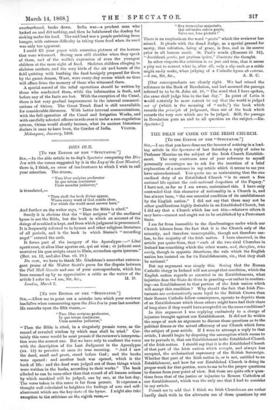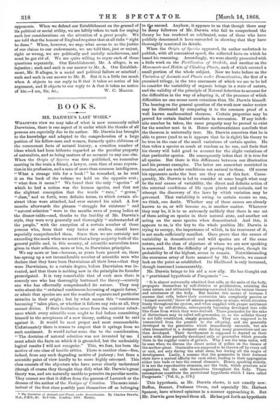THE DEAN OF CORK ON THE IRLSII CHURCH.
[To THE EDITOR OF THE "SPECTATOR."]
SI11,—I see that you have done me the honour of noticing in a lead- ing article in the Spectator of last Saturday a reply of mine to Professor Maurice on the subject of the Irish Church Establish- ment. The very courteous tone of your reference to myself personally encourages me to ask for the insertion of a brief explanation of a sentence in my article which it seems to me you have misunderstood. You quote me as maintaining that the one cardinal duty of an Established Church "is to assert a free national life against the anti-national despotism of the Papacy." I have not, so far as I am aware, maintained this. I have only contended that this character of nationality in a Church is, and has always been, "the one essential condition of its establishment by the English nation." I did not say that there may not be other qualifications highly desirable in an Established Church, but I did say that a Church which has not this—whatever others it may have—cannot and ought not to be established by a Protestant State.
I am far from insensible to the disadvantages under which our Church labours from the fact that it is the Church only of the minority, and therefore unacceptable, though not therefore use- less, to the majority of the Irish nation. I have observed, in the article you quote from, that "each of the two rival Churches in Ireland has something which the other wants, and, therefore, tries sorely, though in opposite directions, the rule which the English nation has insisted on for its Establishments, viz., that they shall be national."
But my argument was simply this. Seeing that the Roman Catholic clergy in Ireland will not accept that condition, which the English nation regards as essential in its Establishments, what injustice does the State do them in granting—or rather in continu- ing—an Establishment to that portion of the Irish nation which will accept this condition ? Why shoull the fact that Irish Pro- testants are ecclesiastically more loyal to the British Crown than their Roman Catholic fellow-countrymen, operate to deprive them of an Establishment which those others might have had their share of long since if they would have accepted it on the same conditions?
In this argument I was replying exclusively to a charge of injustice brought against our Establishment. It did not lie within the scope of such an argument to discuss those questions as to the political fitness or the actual efficiency of our Church which form the subject of your article. If I were to attempt a reply to that article, I should begin by disputing the assumption which seems to me to pervade it, that our Establishment is the Established Church of the Irish nation. I should say that it is the Established Church of that part of the Irish nation which accepts, and always has accepted, the ecclesiastical supremacy of the British Sovereign. Whether that part of the Irish nation is, or is not, entitled to an Establishment, and how far our Established Church is doing its proper work for that portion, seem to me to be the proper questions to discuss from your point of view. But these are quite other ques- tions from that of the justice or injustice to Roman Catholics of our Establishment, which was the only one that I had to consider in my article.
Permit me to add that I think we Irish Churchmen are rather hardly dealt with in the alternate use of these questions by mu'
opponents. When we defend our Establishment on the ground of its political or social utility, we are loftily taken to task for urging such low considerations on the attention of a great people. We are told that the honour of England requires that at all risks "right be done." When, however, we urge what seems to us the justice of our claims to our endowments, we are told that, just or unjust, right or wrong, we are politically and socially mischievous, and must be got rid of. We are quite willing to argue each of these questions separately. Our Establishment, Mr. A alleges, is an injustice ; such and such is our answer to Mr. A. Our Establish- ment, Mr. B alleges, is a social and political failure or mischief ; such and such is our answer to Mr. B. But it is a little too much when A objects to our reply to B that it takes no notice of his argument, and B objects to our reply to A that it takes no notice































 Previous page
Previous page